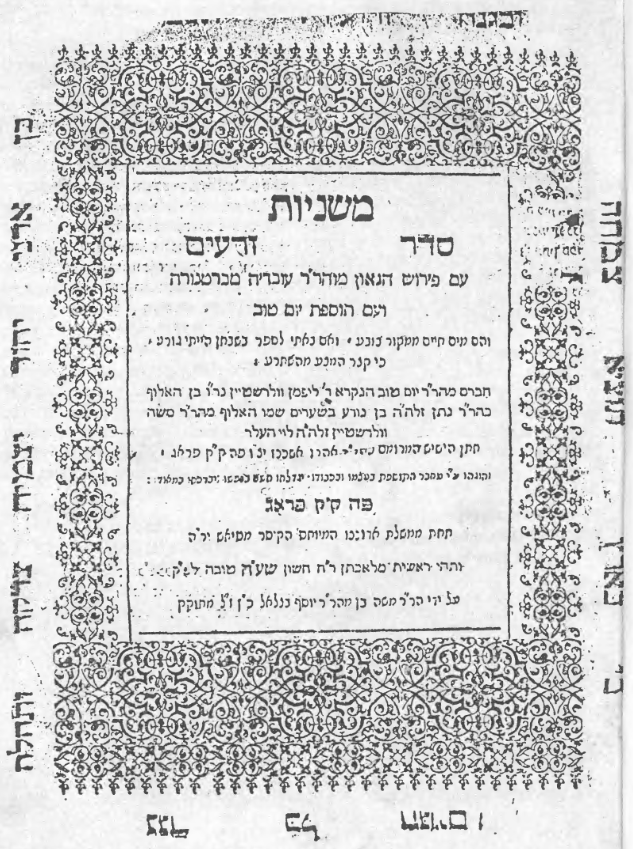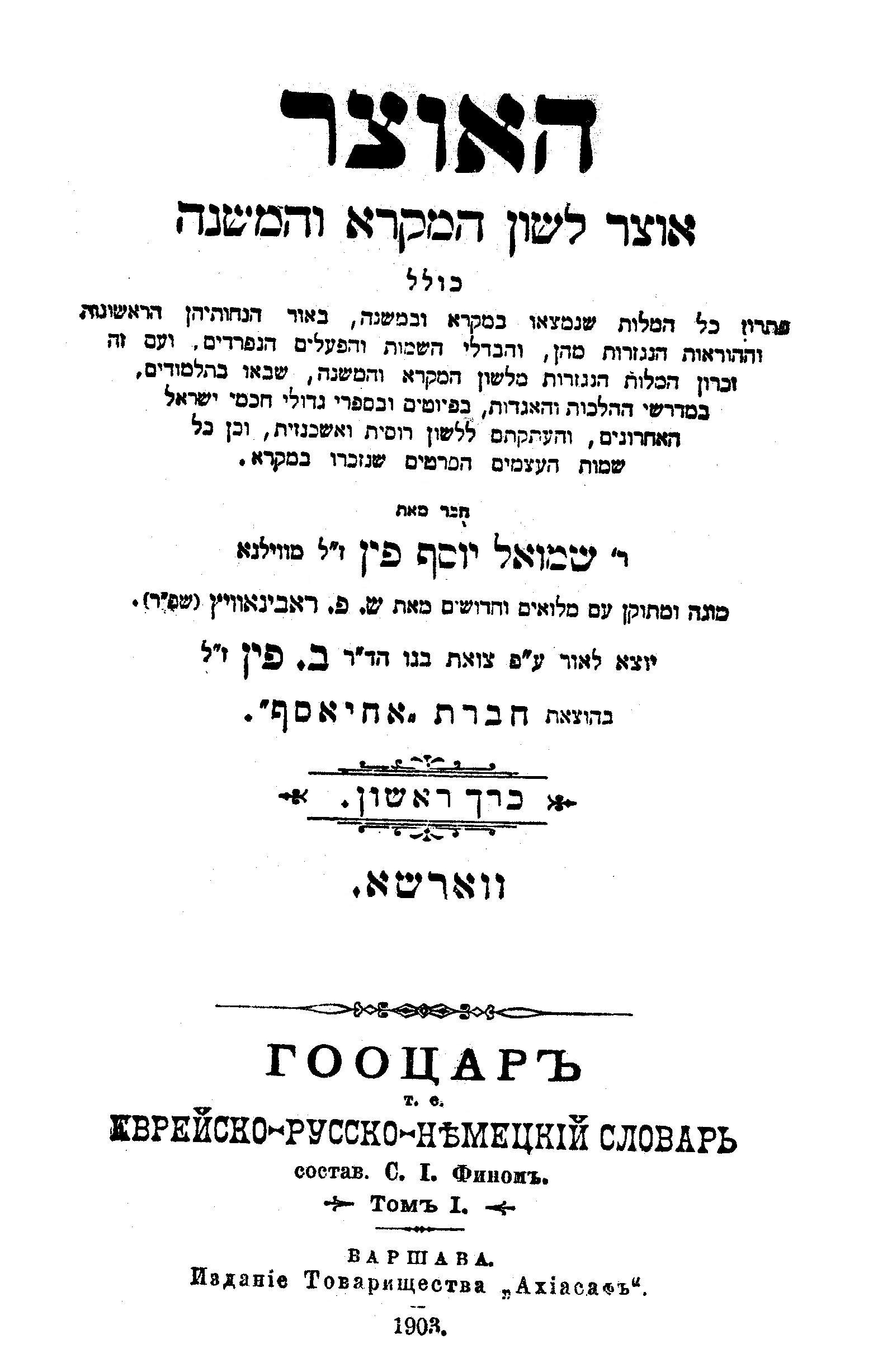|
Jacob Ben Ephraim
Jacob ben Ephraim (died in Lublin 1648) was a Polish rabbi. At first he occupied the post of rabbi and instructor at the yeshivah of that city, whence he was called to officiate as rabbi in Brest. There he entertained in 1631 R. Yom-Ṭob Lipman Heller, who speaks of him with great respect, and mentions his officiating as rabbi in the two cities cited ("Megillat Ebah," p. 28). From Brest he returned to Lublin as rabbi, and remained there till his death. Jacob was known as "the Gaon Rabbi Jacob of Lublin"; for he was the teacher of the most eminent Polish rabbis of his time, who studied in his yeshivah and profited by his extensive knowledge of Halakah ''Halakha'' (; he, הֲלָכָה, ), also transliterated as ''halacha'', ''halakhah'', and ''halocho'' ( ), is the collective body of Jewish religious laws which is derived from the written and Oral Torah. Halakha is based on biblical commandm .... Only a few of his responsa have been preserved: these are to be found among ... [...More Info...] [...Related Items...] OR: [Wikipedia] [Google] [Baidu] |
Lublin
Lublin is the ninth-largest city in Poland and the second-largest city of historical Lesser Poland. It is the capital and the center of Lublin Voivodeship with a population of 336,339 (December 2021). Lublin is the largest Polish city east of the Vistula River and is about to the southeast of Warsaw by road. One of the events that greatly contributed to the city's development was the Polish-Lithuanian Union of Krewo in 1385. Lublin thrived as a centre of trade and commerce due to its strategic location on the route between Vilnius and Kraków; the inhabitants had the privilege of free trade in the Grand Duchy of Lithuania. The Lublin Parliament session of 1569 led to the creation of a real union between the Crown of the Kingdom of Poland and the Grand Duchy of Lithuania, thus creating the Polish–Lithuanian Commonwealth. Lublin witnessed the early stages of Reformation in the 16th century. A Calvinist congregation was founded and groups of radical Arians appeared in the city ... [...More Info...] [...Related Items...] OR: [Wikipedia] [Google] [Baidu] |
Brest, Belarus
Brest ( be, Брэст / Берасьце, Bieraście, ; russian: Брест, ; uk, Берестя, Berestia; lt, Brasta; pl, Brześć; yi, בריסק, Brisk), formerly Brest-Litovsk (russian: Брест-Литовск, lit=Lithuanian Brest; be, links=no, translit=Berastze Litouski (Berastze), Берасце Літоўскі (Берасце); lt, links=no, Lietuvos Brasta; pl, links=no, Brześć Litewski, ), Brest-on-the-Bug ( pl, links=no, Brześć nad Bugiem), is a city (population 350,616 in 2019) in Belarus at the border with Poland opposite the Polish city of Terespol, where the Bug (river), Bug and Mukhavets rivers meet, making it a border town. It is the capital city of the Brest Region. Brest is a historical site for many cultures, as it hosted important historical events, such as the Union of Brest and Treaty of Brest-Litovsk. Furthermore, the Brest Fortress was recognized by the Soviet Union as a Hero Fortress in honour of the defense of Brest Fortress in Jun ... [...More Info...] [...Related Items...] OR: [Wikipedia] [Google] [Baidu] |
Yom-Tov Lipmann Heller
Rabbi Gershon Shaul Yom-Tov Lipmann ben Nathan ha-Levi Heller (c. 157919 August 1654), was a Bohemian rabbi and Talmudist, best known for writing a commentary on the Mishnah called the ''Tosefet Yom-Tov'' (1614–1617). Heller was one of the major Talmudic scholars in Prague and in Poland during the "Golden Age" before 1648. Education and rabbinic career After Heller was born in Wallerstein, Bavaria, he was raised by his grandfather, Rabbi Moses Ha-Levi Heller, as his father died at the age of 18 before he was even born. As a teenager Heller was sent to Friedberg, near Wallerstein, where he studied in the Yeshiva of Rabbi Jacob Günzburg. From there he moved to Prague, where he became a disciple of the Maharal, head of the yeshiva of Prague. In 1597, when Heller was scarcely 18 years old, he received a Semicha (appointment) as a Dayan (rabbinic judge) in that city. In October 1624 Heller was called to the rabbinate of Mikulov, Moravia, and in March 1625, became rabbi of Vienna. L ... [...More Info...] [...Related Items...] OR: [Wikipedia] [Google] [Baidu] |
Halakah
''Halakha'' (; he, הֲלָכָה, ), also transliterated as ''halacha'', ''halakhah'', and ''halocho'' ( ), is the collective body of Jewish religious laws which is derived from the written and Oral Torah. Halakha is based on biblical commandments (''mitzvot''), subsequent Talmudic and rabbinic laws, and the customs and traditions which were compiled in the many books such as the ''Shulchan Aruch''. ''Halakha'' is often translated as "Jewish law", although a more literal translation of it might be "the way to behave" or "the way of walking". The word is derived from the root which means "to behave" (also "to go" or "to walk"). ''Halakha'' not only guides religious practices and beliefs, it also guides numerous aspects of day-to-day life. Historically, in the Jewish diaspora, ''halakha'' served many Jewish communities as an enforceable avenue of law – both civil and religious, since no differentiation of them exists in classical Judaism. Since the Jewish Enlightenment (''Haska ... [...More Info...] [...Related Items...] OR: [Wikipedia] [Google] [Baidu] |
Samuel Joseph Fuenn
Samuel Joseph Fuenn (; 15 October 1818 – 11 January 1891), also known as Rashi Fuenn () and Rashif (), was a Lithuanian Hebrew writer, scholar, printer, and editor. He was a leading figure of the eastern European Haskalah, and an early member of Ḥovevei Zion. Biography Fuenn was born in Vilna, Russian Empire, the son of merchant and Torah scholar Yitsḥak Aizik Fuenn of Grodno. Though he received a traditional religious education until the age of 17, he also acquired an extensive general knowledge of German literature and other secular subjects, and became proficient in Russian, French, Latin, Polish, and English. He afterwards joined Vilna's circle of young ''maskilim''. In 1848 the government appointed him teacher of Hebrew and Jewish history in the newly founded rabbinical school of Vilna. Fuenn filled this position with great distinction till 1856, when he resigned. The government then appointed him superintendent of the Jewish public schools in the district of Vilna, ... [...More Info...] [...Related Items...] OR: [Wikipedia] [Google] [Baidu] |
Year Of Birth Missing
A year or annus is the orbital period of a planetary body, for example, the Earth, moving in its orbit around the Sun. Due to the Earth's axial tilt, the course of a year sees the passing of the seasons, marked by change in weather, the hours of daylight, and, consequently, vegetation and soil fertility. In temperate and subpolar regions around the planet, four seasons are generally recognized: spring, summer, autumn and winter. In tropical and subtropical regions, several geographical sectors do not present defined seasons; but in the seasonal tropics, the annual wet and dry seasons are recognized and tracked. A calendar year is an approximation of the number of days of the Earth's orbital period, as counted in a given calendar. The Gregorian calendar, or modern calendar, presents its calendar year to be either a common year of 365 days or a leap year of 366 days, as do the Julian calendars. For the Gregorian calendar, the average length of the calendar year (the mea ... [...More Info...] [...Related Items...] OR: [Wikipedia] [Google] [Baidu] |
1648 Deaths
1648 has been suggested as possibly the last year in which the overall human population declined, coming towards the end of a broader period of global instability which included the collapse of the Ming dynasty and the Thirty Years' War, the latter of which ended in 1648 with the Peace of Westphalia. Events January–March * January 15 – Manchu invaders of China's Fujian province capture Spanish Dominican priest Francisco Fernández de Capillas, torture him and then behead him. Capillas will be canonized more than 350 years later in 2000 in the Roman Catholic Church as one of the Martyr Saints of China. * January 15 – Alexis of Russia, Alexis, Tsar of Russia, marries Maria Miloslavskaya, who later gives birth to two future tsars (Feodor III and Ivan V) as well as Sophia Alekseyevna of Russia, Princess Sophia Alekseyevna, the regent for Peter I. * January 17 – By a vote of 141 to 91, England's Long Parliament passes the Vote of No Addresses, br ... [...More Info...] [...Related Items...] OR: [Wikipedia] [Google] [Baidu] |
17th-century Polish Rabbis
The 17th century lasted from January 1, 1601 ( MDCI), to December 31, 1700 ( MDCC). It falls into the early modern period of Europe and in that continent (whose impact on the world was increasing) was characterized by the Baroque cultural movement, the latter part of the Spanish Golden Age, the Dutch Golden Age, the French ''Grand Siècle'' dominated by Louis XIV, the Scientific Revolution, the world's first public company and megacorporation known as the Dutch East India Company, and according to some historians, the General Crisis. From the mid-17th century, European politics were increasingly dominated by the Kingdom of France of Louis XIV, where royal power was solidified domestically in the civil war of the Fronde. The semi-feudal territorial French nobility was weakened and subjugated to the power of an absolute monarchy through the reinvention of the Palace of Versailles from a hunting lodge to a gilded prison, in which a greatly expanded royal court could be more easily k ... [...More Info...] [...Related Items...] OR: [Wikipedia] [Google] [Baidu] |





